You have your amazing startup plan ready, and you are ready to win the world with your business plan. But, the one thing stopping you is capital funds. Capital is an essential component of starting a business. So, what do you do now? Drop your plan? Heck no! To help you start your startup, today, we have listed the top ten best crowdfunding sites.
This crowdfunding method helps businesses and startups gather ample funding required to implement their startup idea successfully. They do this by gaining financial reports, network tapping, and reaching out to potential contributors and investors in the market. Therefore, the crowdfunding method is a great way to gather funds for your business.
What is Crowdfunding?
Crowdfunding is an ingenious method of raising funds and capital. This is done with the help of contributions. These contributions are generally made through clients, individual investors, family, friends, crowdfunding platforms, or social media. As mentioned earlier, this crowdfunding method allows startup owners to gather appropriate and sufficient funds needed for implementing their startup ideas successfully.
Long gone are the days when you had to borrow from your friends or family or visit the bank repeatedly for loans for funding your startup. Most of the time, the bank do not offer loans to startup businesses due to the lack of collateral. Also, it was hard to convince your friends and families to let you borrow for funding.
With the rapid change and advancement of technology and science, the digital era has brought innovative and effective business models, shattering the traditional business methods. One such innovation in technology is crowdfunding. Hence, crowdfunding for business is an effective way to gather funds for your amazing business ideas.
Also Read: Crowdfunding for a Small Business: Pros and Cons
How does this work?
Now, a question might pop up as to how does crowdfunding works? When you think of using crowdfunding sites, first you have to register yourself and create a profile. You can then create your campaign or a fundraising page to tell your story about raising funds.
You also have to mention what you need it for. Moreover, you also have to mention and set a fundraising goal, and then start raising money. You can start collecting funds within days. It completely depends on the kind of fundraising site you choose. Some crowdfunding sites have 30 days campaign and even longer. The funds are directly deposited to your bank account you link with your crowdfunding profile.
What can you use it for?
The money or funds you generate must be used for the exact purpose you have stated in your profile. Let’s say non-profit organizations can raise money for missions and purposes and keep using them for that particular mission. Startups and small businesses can raise money for their business in exchange for some profit or products and services, and you can raise money in many more ways like these.
Also, people looking for investing in businesses or startups through crowdfunding buy shares after a certain point in time. Also, keep in mind that you will surely get your investment returns. If the money aces or goes public. Moreover, if the company you have invested in does not yield satisfactory results or shuts down, you can lose money.
Types of Crowdfunding
If you aren’t aware that there are different types of crowdfunding, we have listed them for you. Each crowdfunding is different from the other and has its own purpose as well. Therefore, before going for a certain crowdfunding method, you must know its purpose, pros, and cons.
1. Donation-based crowdfunding
Donation-based crowdfunding is a fund collection process where contributors or investors make a small to a hefty financial contribution. This crowdfunding aims for a non-profit organization or a social cause. For example, working for the downtrodden, planting trees, sponsoring children’s education, digging a well in a water-scarce area, helping and rescuing animals, etc.
For raising funds for social causes, people are opting for crowdfunding sites like Crowdrise and GoFundMe. So, this crowdfunding is best for social enterprises, non-profit organizations, and charities.
Pros:
- In donation-based crowdfunding, you do not have to share any money or rewards to donors and contributors. You post the details of your social cause on the crowdfunding site, and in quite some time, you will be receiving funds for your cause and mission. Therefore, donation-based crowdfunding sites are a great way to raise money for a cause.
- This crowdfunding does need you to give up a specific section of your business. You do not pay the donors back either. This is entirely for the community. Hence, this is a completely win-win situation.
Cons:
- If you plan to use the money for some other purpose, you might lose your organization’s reputation and credibility.
2. Reward-based crowdfunding
Now, as its name suggests, reward-based crowdfunding is a method where donors or contributors, after investing, expect a reward in return. The reward can be a service or a product. This product or service is what your business is selling or offering. Moreover, this reward does not always have to be a product or service. This can be a discount or discounted fixed fee sale.
Kickstarter is one of the best and leading reward-based crowdfunding sites.
Reward-based crowdfunding is best for manufacturing and IT business, creative freelancers who raise money for their equipment.
Pros:
- You do not have to lose an important portion of your company’s money. In reward-based crowdfunding, all you will be doing is rewarding a product or service you are already selling. Therefore, this does not cost you much. You might face just one problem, that is while shipping the donor their promised reward. This process is much better compared to equity funding, as explained below.
- There is one reason why most of the startup are opting for reward-based crowdfunding nowadays. This is because your product’s image already establishes in the market, and you have a product following. Entrepreneurs gain more confidence while revealing their products on these. You get instant response as well as review. So, by judging the audience’s reaction to the product or service, you can tell whether the product will be a hit or a miss in the market, and all o you can make necessary changes.
Cons:
- If you can raise money, this does not mean your business can be a hit. There have been many instances when businesses failed due to mismanagement. Also, as stated earlier, a startup might face problems while shipping and delivering the reward product.
3. Equity crowdfunding
Equity crowdfunding is a great way to raise the required fund from investors. The funds gathered are just appropriate to give a kickstart to your startup. The returns of this funding are in the form of a percentage of ownership of your company, in other words, in the form of equity. Now, this is possible only when the startup has taken off.
This type of crowdfunding helps you gather the appropriate amount of funds, unlike reward-based or donation-based crowdfunding methods. This funding can also help a startup to move past the growth stages. Equity crowdfunding is not restricted to only noble cause or creative startup idea.
The major equity crowdfunding sites include CrowdCube and Seedrs. It is most suitable for early-stage businesses and startups.
Pros:
- compared to other crowdfunding methods, equity crowdfunding generates more funds and gives a good start to your startup or business.
- You do not have to deal with a lot of investors. Crowdfunding sites help startup owners and entrepreneurs deal with many investors in the form of one investor. Hence, it saves time and confusion regarding the number of different suggestions provided by multiple investors. Moreover, it also makes sure that no one investor has the ability to disrupt the decision-making process of your startup.
Cons:
- One of the main and most disadvantageous equity crowdfunding factors is sharing and giving up a part of ownership or equity. Therefore, this can have a substantial effect and result in the decision-making part of your startup.
4. Debt crowdfunding
Debt crowdfunding investors do want any reward or equity from your company. This method is quite similar to that of borrowing a loan. In exchange for the financial interest, investors sent a principal along with some interest. Therefore, your investors act as your bank, but quite lenient ones.
Also, when you take a loan from a bank, you borrow a heft amount. But, in debt crowdfunding, you can borrow small loans from multiple numbers of investors.
People usually utilize these funds for office or home renovation, purchasing some equipment or machines, buying a car, and other personal reasons.
ZOPA is a great platform for debt crowdfunding.
Debt crowdfunding best suits small-stage businesses and startups.
Pros:
- Let’s admit; not everyone can get the perfect amount of loan from the bank as desired. But, in debt crowdfunding, you can take multiple small loans from multiple investors and at different times. Therefore, the availability of many investors on a single platform showing interest in your campaign increases the likeliness of getting the fund. Moreover, the interest amount is lesser than what you pay to the bank.
Cons:
- Debt crowdfunding saves you from repetitive trips to the bank. But, do remember that debt is a debt. So, you have to repay it in any way. Hence, adding to the stress of repaying it.
Best Crowdfunding Sites for Startups
Now that we have discussed and known the different types of crowdfunding, it is time to look at the top 10 crowdfunding sites. These sites will surely help you to give a good start to your business and help it grow. With your business ideas in your mind, go through the following crowdfunding websites.
1. Indiegogo
Since 2008, Indiegogo has given wings to ideas and startup plans by successfully providing funds to the entrepreneurs. It has helped to achieve over 800,000 ideas. Therefore, there is no doubt Indiegogo is one of the best crowdfunding websites.
Danae Ringelmann, Slava Rubin, and Eric Schell founded Indiegogo Incorporation in 2008. These people sought to fund their own ideas and causes. Therefore, they understood the problem of raising funds for their ideas, startups, and causes. More than 19,000 campaigns are launched per month in Indiegogo. And more than 10,000,000 people visit the website.
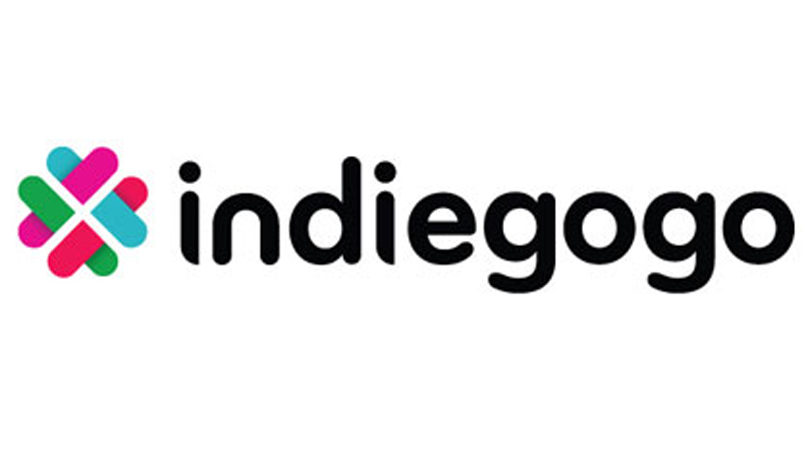
Indiegogo
Indiegogo is available in 235 territories and countries. So, you can launch a campaign from almost anywhere in the world and present your ideas to a myriad of investors and donors. You can easily set up a campaign for up to 60 days. The platform fee is 5%, whereas the third-party processing fee ranges from 3% to 5%.
To promote your platform, you can even integrate with Google and Facebook. After you have completed raising funds, it will automatically process to your bank account. Indiegogo has an A+ rating. Moreover, it is integrated with BBB or Better Business Bureau. Therefore, there is no doubt why Indiegogo is so famous among budding entrepreneurs.
2. GoFundMe
GoFundMe is a great platform for crowdfunding for business and raises funds for any cause, from medical expenses to buying equipment. It is a great choice for personal fundraising interests. It has a track record of bringing $9 billion funds from more than 120 billion donors.

GoFundMe
There are just three simple steps to set a page and campaign on GoFundMe. Firstly, create a campaign stating the amount of needed funding. Secondly, tell about your business and story and all share photos and videos. Lastly, share your campaign with investors, families, friends via text, email, and social media.
You can even send. Thank you notes and for withdrawing certain funds with the site’s simple dashboard. Moreover, the best part is it has a 0% platform me. But, it does have a processing fee of 1% and per transaction $0.30. Also, you can raise funds for as long as you want; there are no deadlines.
3. SeedInvest
This is one of the best startup crowdfunding platforms. Over the yea,r SeedInvest has attracted more than 300,000 investors and given wings to 200 startups by raising more than $200 million funds. Therefore, SeedInvest technology is a great match for startup entrepreneurs.
To raise funds through SeedInvest, you have to sign up, fill out an application, and then proceed towards the screening process. This includes due diligence check. After you are done with your fundraising process, SeedInvest will take 5% equity fees and 7.5% platform fees.
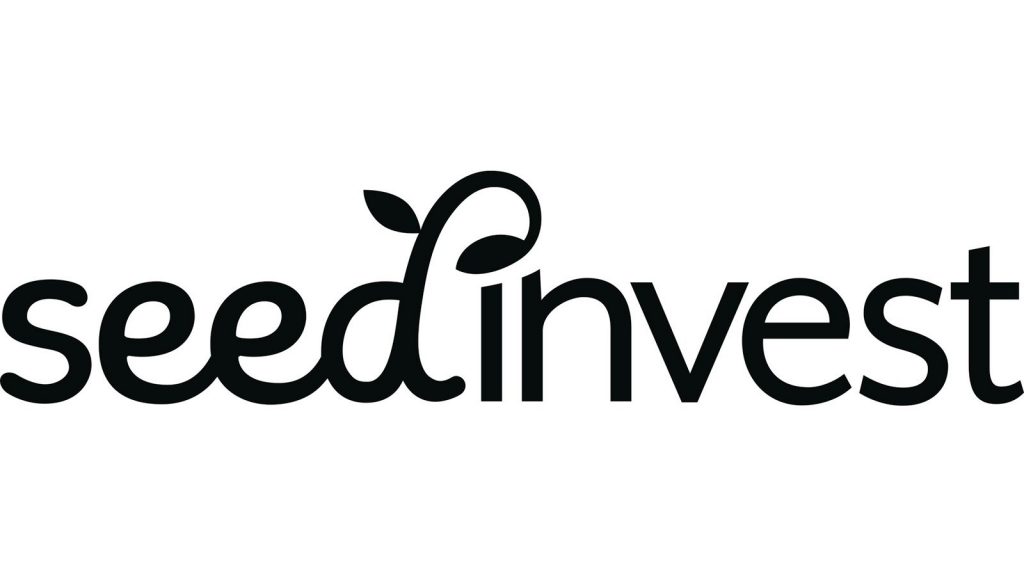
SeedInvest
SeedInvest has a calculator to calculate how much it might cost you to raise funds in this platform. The campaign length depends on the business. Therefore, it can take from 45 days up to 6 months.
This is a great crowdfunding platform as it makes your campaign reach angel investors and venture capital firms. Also, you do not have to pay anything if your fundraiser is a failure or unsuccessful.
4. Patreon
Patreon is an easy to use platform with its subscription and fundraising options when looking for “patrons” to invest in your idea. It is trusted by over 200,000 creators, including artists, musicians, and writers.
Jack Conte founded Patreon in 2013. To date, it has attracted more than 200,000 creators and has been able to bring more than $2 billion in funds for its users. Hence, this makes it a clear winner for creative professionals.
Creative people raise funds in this platform from their admirers, family, supporters, and friends. You can use Patreon free for me. But, it does have a monthly fee, and it depends on the monthly plan you choose. The “Lite” plan cuts a 5% fee from the money raised, the “Premium” plan cuts 12%, and the “Pro” plan gets 8%. Moreover, the site charges a 2.9% processing fee and $0.30 per payment.

Patreon
The Lite plan is for people who are just getting started with their creative endeavors. The Pro plan intends on establishing and growing the business. A premium plan is for already established creators and artists who generate more than $6,000 per month from this platform and have at least 100,000 social media followers. With all these plans, you get handy business tools, Patreon apps, and more.
Therefore, Patreon is a great choice for artists trying to create their own startup and earn it. You can easily switch between Pro and Lite plans, but the Premium plans need at least 3 months commitment.
5. Kickstarter
Kickstarter is another well-known crowdfunding website. It focuses on creative ideas and endeavors like design, art, film, gaming, and other creative forms. This crowdfunding website helps entrepreneurs and creators get connected with the resources to bring their plans and ideas to life. Moreover, Kickstarter is a reward-based crowdfunding website.
Kickstarter is perfect for startups who have a clearly defined goal. The website has helped over 15 million artists, musicians, designers, filmmakers, and others to kickstart their ideas. They have raised over $1.3 billion to fund more than 143,000 startups and projects.
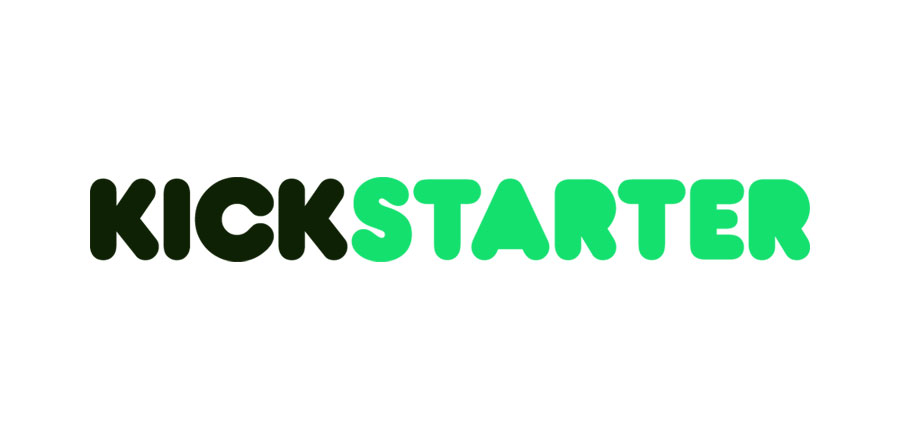
Kickstarter
Now, you must have a great plan for your business and hive rewards to investors, or all your money goes back to them. Therefore, present your campaign smartly and impress investors.
Kickstarter’s campaign creation is free of cost, but it does take 5% from your total collected funds and 3-5% processing fees. Hence, if you are a creative person, then Kickstarter is a great option for you.
6. Crowdfunder
Crowdfunder is an equity crowdfunding platform as well. It is ideal for startups and fascinating, unique, and creative business ideas and plans. It has a community of 200,000 investors and entrepreneurs.
So, do get connected to it if you have confidence in your creative ideas. This means that you have to sell shares to your investors, and they won a part of your business’ ownership.
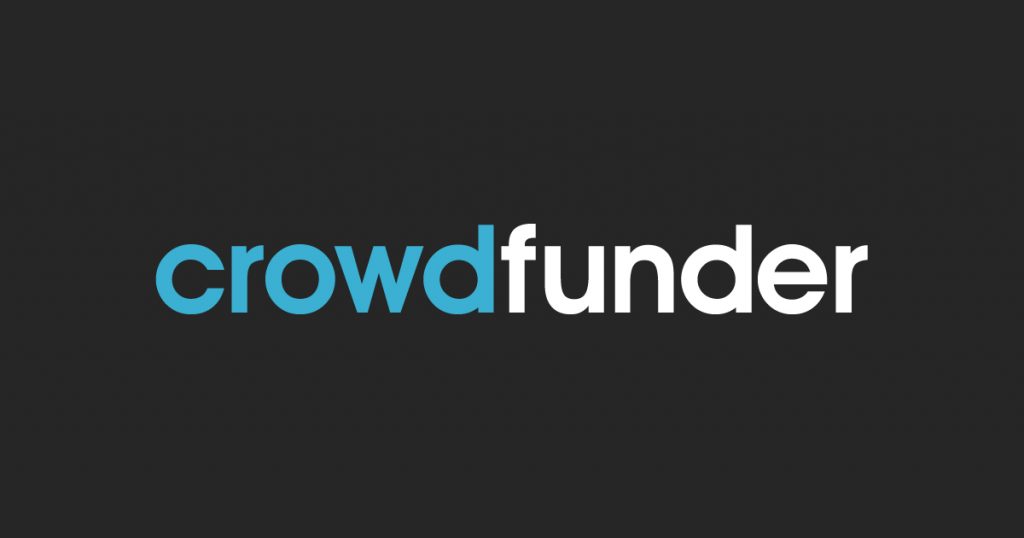
CrowdFunder
They have raised over $150 million in funds for A-series aandPre-Seed businesses and connected them to angel investors and VCs.
Crowdfunder has three plans. Free, Starter plan for $299/month, and Premium plan for $499/month. Each has different personalized support, document storage, and other facilities. It also charges 5% of successful investments.
7. Fundable
Part of the Startups.co, Fundable allows US startups to offer equity or rewards in exchange for funding. Consumer-facing organizations can raise to $50,000 with the rewards program allowing owners and entrepreneurs to sell their service, products, selling merchandise, and taking pre-orders.
In the equity program, companies wanting to raise between $50,000 to $10,000,000 for their service, product, or B2B business, can offer their equities to the investors. Therefore, as per your want, you can choose the program accordingly.
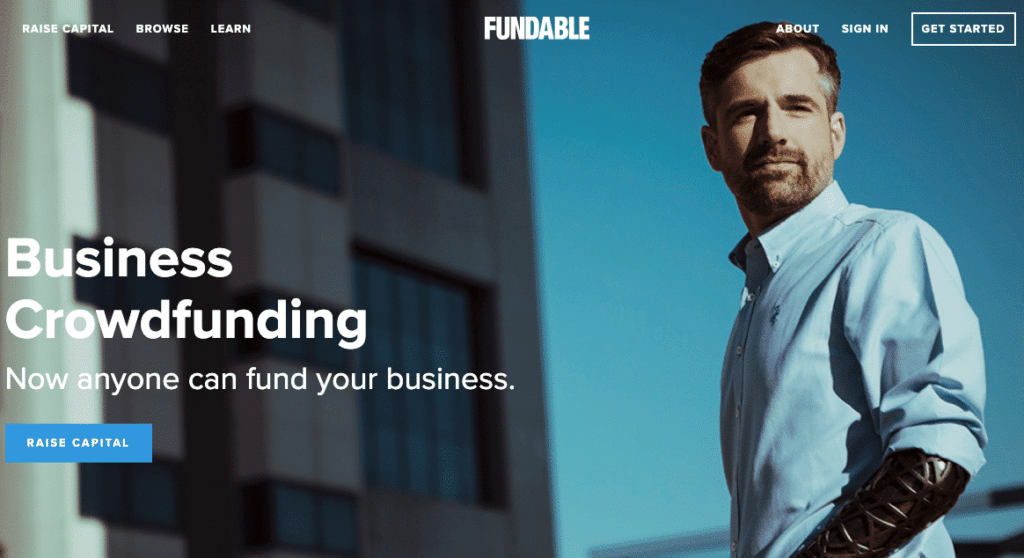
Fundable
Profile creation in Fundable is free of cost. But, it does take $179 per month to fundraise. For reward-based fundraising, there is a 3.5% processing fee and $0.30 per transaction.
To raise a good amount of funds in the equity fund, you must have a good track record, a pitch deck, and a solid business plan, to say the least.
8. LendingClub
LendingClub is debt-based crowdfunding. You get connected to the investors and take loans from them as fundraising. It offers up to $40,000 personal loans, and for business loans, you can get up to $300,000.
Over here, investors buy some notes corresponding to fractions of loans in exchange for solid returns. LendingClub screens all borrowers thoroughly and facilitates all transactions as well.
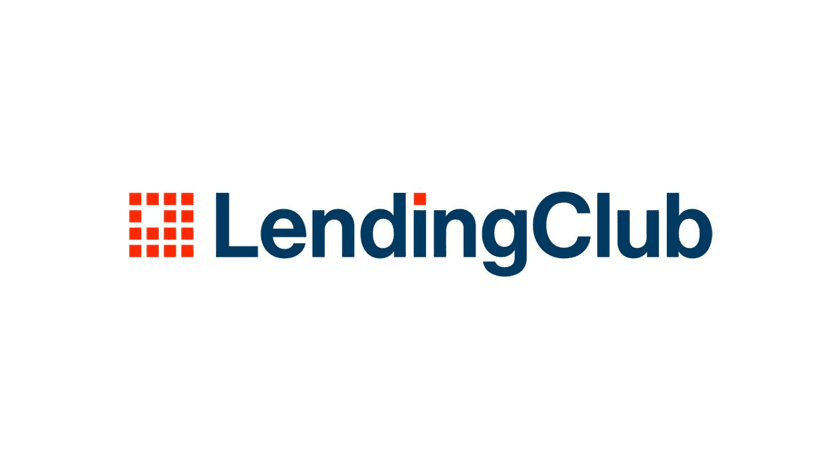
LendingClub
When you get a business loan through LendingClub, you will receive your capital immediately upfront for one to five years term. There will be no prepayment penalties or monthly payments.
On LendingClub, there is an origination fee ranging between 1.99% and 8.99%. There are monthly payments between $227 and $955 per $10,000 borrowed from investors, with total annualized rates ranging from 9.77% to 35.1%.
9. WeFunder
With WeFunder. You will be able to raise between $50,000 and $50 million from donors and investors. Most campaigns take between 1 to 3 months to reach their desired goals. From a small business to tech startups, you will be able to raise funds from more than 150,000 WeFunder investors.
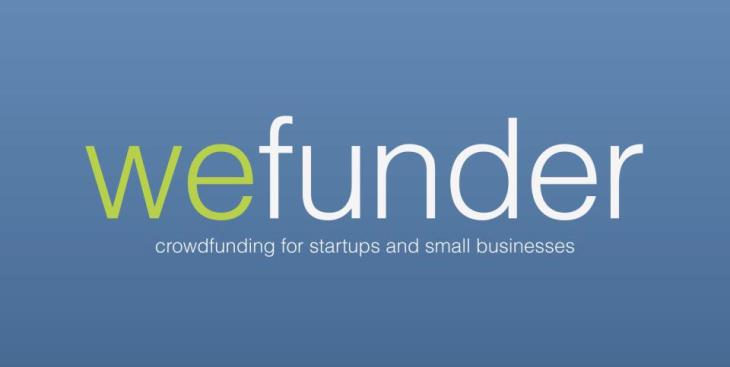
WeFunder
It is completely free to create a WeFunder profile, and they don’t charge transaction fees or management fees. Administrative fees are charged to investors to cover all the costs of operating WeFunder.
10. Crowdcube
Last but not least, we are featuring Crowdcube. This is also one of the leading equity crowdfunding sites. This website turns your customers, family, friends, fans into investors.
Crowdcube will help you set a sensible valuation, realistic targets, a well-executed communication plan, and an effective pitch to unlock Crowdcube’s investor community.
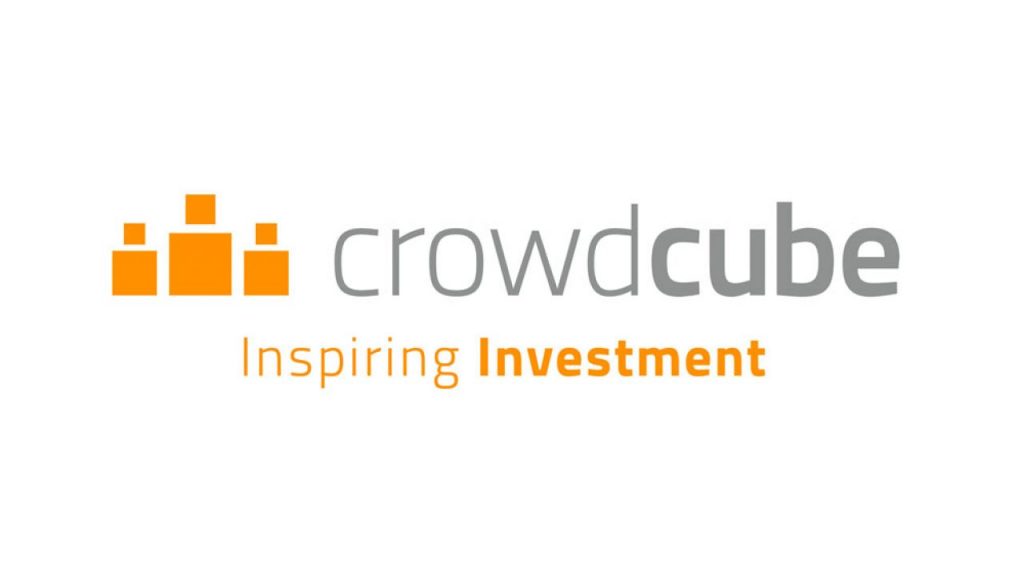
Crowdcube
You will be able to launch publicly when your pitch reached twenty percent. It takes 22 days for an average pitch to reach its specific target. When you reach 75%, Crowdcube’s legal team will join you to complete your round quickly.
It is completely free to list your business on Crowdcube. When you successfully raise the amount, you will be charged a 7% success fee. There is also a payment processing fee.
Summing up!
So, these were some of the leading crowdfunding sites. When you sign up on any of these crowdfunding websites, you make sure your business gets a kickstart and reaches heights. Crowdfunding is a great way to gather funds without the hassles of the bank. So, what’s making you wait?

No Responses